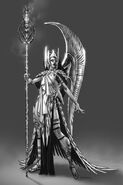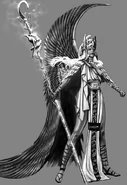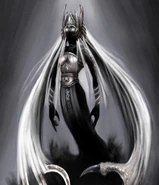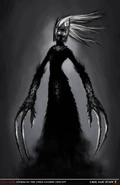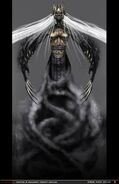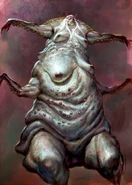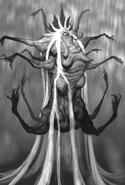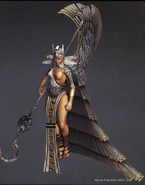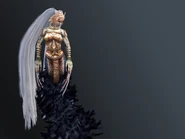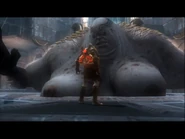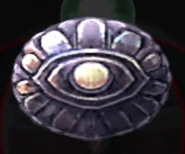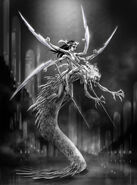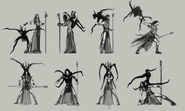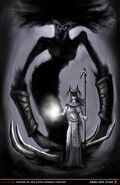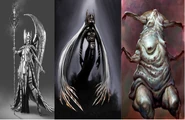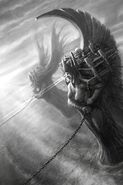| “ | There is no power greater than the Sisters of Fate. If you challenge us, you... will... die! | ” |
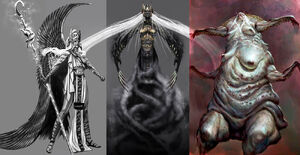
The Sisters of Fate, from left to right : Lahkesis, Atropos and Clotho.
The Sisters of Fate or Moirai are three Primordial sisters born from Erebus and Nyx. They have the power to control time itself and control the fate of all Titans, Gods, and especially mortals. They serve as the secondary antagonists of God of War II, until their defeat at the hands of Kratos in his quest for revenge against Zeus.
Greek Mythology
Referred to in Mythology as the Moirai, or the Fates; Clotho, Lahkesis, and Atropos were the daughters of Erebus and Nyx.
As the three Sisters of Fate, Lachesis, Atropos, and Clotho determined the fates of every mortal, God, and Titan. Clotho weaved the Threads of Fate, beginning all life. Lahkesis would measure the threads, determining how long a mortal, God and Titan's life span would be. Atropos cut the threads, ending the life.
In God of War
God of War II
The Loom of Fate
In God of War II, after having been betrayed by Zeus, Kratos was stripped of his godly power and killed. Although he managed to fight his way out of Hades and back to the living realm, he was rendered mortal, and thus it was literally impossible for him to enter Mount Olympus to face Zeus. The only way he could get his revenge would be to change the way events had played out to change his fate. To do so, he traveled to the Island of Creation to find the Loom of Fate, which has the power to control time and thus the power to let Kratos change his past.
The Sisters of Fate
To control the Loom, Kratos must battle the three Sisters of Fate, who were loyal to Zeus and utterly hellbent against granting Kratos this power, frightened that the Ghost of Sparta would bring doom to Greece should he use it.
Battle With Kratos
At first, Lahkesis confronted Kratos alone. When bested by Kratos, Lahkesis summoned her sister Atropos from within a mirror. Atropos carried Kratos through the mirror, back in time, to the final fight between Kratos and Ares. She threatened to kill Kratos' past self by destroying the Blade of the Gods - without it, Ares would triumph over the Spartan, and the Kratos fighting the Sisters would retroactively be erased from existence. Kratos protected the sword and defeated Atropos, thereby hurling him back to Lahkesis' throne room. Desperate, Lahkesis and Atropos fought Kratos together. After a violent battle Kratos managed to throw them into one of their inter-dimensional mirrors and shattered it, trapping the two Sisters for good.
The Loom Chamber
The final sister, the hideously deformed Clotho, awaited Kratos in the Loom Chamber beyond. While Kratos made his way to her head, he disabled five of her smaller arms blocking his way up. Once at the top level, he disabled her two main arms, giving him time to bring up a giant swinging blade. With this blade, he impaled Clotho through her head, killing her. With all the Sisters of Fate vanquished, Kratos finally granted himself the power to change the past and control time.
God of War III

Kratos facing the Sisters of Fate in the God of War III intro.
During his final confrontation with Zeus, Kratos was forced to confront all the fears and evils of his past. In doing so, he found himself in a pool of blood, where he could hear the voices of his victims. Amongst the voices, the Sisters of Fate could be heard. Their views, of which they informed Kratos during their previous battles, echoed across the pool. "You cannot change your Destiny, Mortal...". Provided Kratos dwelt across the pool longer, The Sisters were heard again; "Your soul will never find peace for what you have become”.
God of War (2018)
When Kratos asks Atreus the meaning of the runes in the Nornir Chests, Atreus says each of them represent each of the Norns. This caused Kratos to remember the Sisters of Fate from Greece and states that nothing good comes out of the Nornir.
God of War: Ragnarök (2022)
Many years following their defeat, Kratos would recount the tale of the sisters and how they abused their power when Mimir asked him about the fates of his homeland after hearing about Freya's experience with the Norns and how he heard that the legends of Kratos were exaggerated and how it strained credulity, in particular his travel back in time to change the outcome of his first fight with Zeus which resulted in his death. Freya in response would claim that the power held by the sisters was the most irresponsible thing she had heard and how the Norns did not have any powers like them, with Mimir then adding that if Odin had access to power like the ones held by the sisters then they would be in an even more worse situation than they were already in.
Inconsistencies
The Sisters of Fate are the source of multiple plot holes in the series timeline, as they create many seemingly illogical plot points to occur all at once, sometimes even in direct contradiction with one another.
While their defeat allows Kratos to travel back in time and nullify nearly all of what transpired in God of War II, this meant that by default their own defeat at the hands of Kratos should have been nullified as a result, thereby allowing them to interfere and have Kratos destroyed for good. However, after returning to the past Kratos immediately tells Zeus that "the Sisters of Fate are dead" even if they are not as they are technically imprisoned. This, implies that the Sisters of Fate are omnipresent and exist outside of time, meaning that their imprisonment in any timeline results in them being absent in every other timeline as well, but this is impossible since, if they did not exist or were absent from that timeline in which Kratos went to face Zeus, thus Zeus would not even know they exist, so the fact he even mention them mean that they exist in this timeline. Also, if the Sisters of Fate are omnipresent and exist outside of time it would go in contradiction with the time rules that are established earlier in the game, as we can see during the fight against Lahkesis and Atropos that if Kratos die in the past, then he will also die in the future which means that there is only one timeline when events being changed in the past would change the future and not many timelines that would be created depending on the events. Given this, it is impossible that when Kratos go to the past he could claim that the Sisters are dead.
This, however, creates large inconsistencies with the rest of the plot. If the Sisters of Fate did indeed disappear from every other age, then they had not the ability to affect the outcome of the Titanomachy as Lahkesis claimed they did, by allowing the Olympians to win, attributing her interference to the reason of the Gods' victory. However, when Kratos returned to the time of the Great War, the battle was still in the favor of the Gods. In this very time, Kratos successfully dragged the titans back with him to the present timeline allowing the second Titanomachy to begin.
The time travel of the Titans, however, alters several future events. Cronos was the Titan chosen to carry Pandora's Temple and made to wander the Desert of Lost Souls, yet, he still had the temple on his back and was sent to Tartarus by a fearful and angered Zeus. The defeat of the Titans and their subsequent imprisonment in Tartarus, is what allowed Atlas to be chained, and Persephone to find and free him, in order to enact her plan that involved kidnapping Helios in order to use his power to destroy the Pillar of the World thereby causing the world to be destroyed and revert to Chaos. If said events did not occur, then Atlas could not be chained and made to hold the world on his shoulders, nor could he have aided Kratos in reaching the Fates. Yet by Helios' own account, the events still happened as normal. The defeat of the Titans also allowed Thera to be imprisoned, thereby allowing her to be found by Kratos who released her, earning him Thera's Bane, which was the power he utilized to defeat Thanatos himself prior to his fallout against Zeus.
It is, however, possible that Kratos may have saved some, but not all of the Titans, in which case, some of the Titans may have still been defeated and imprisoned and tormented, allowing the events of the entire series to play out as normal. Nonetheless, this doesn't explain the Gods' overwhelming triumph during the Great War if the Sisters were indeed simultaneously terminated from all eras, although it could be the simple fact that the Gods were simply stronger than the Titans, or that there are limitations to how much Fate can be altered. One of the tenets of Greek Mythology is that fate cannot be defied whatsoever. Any attempt to defy fate will result in a chain of events that ultimately result in the outcome that is being avoided. This means that the defeat of certain Titans is destined to happen and no matter how much one tampers with the timeline, this will not change. This might mean that some Titans are predeterminated to fall, for their destiny is to play out their role in helping Kratos fulfill his own destiny and continue the Cycle. This might also mean that even the Fates themselves are ironically unable to avoid their own fate, and that even in the chance that their defeat was undone, that they are fundamentally unable to alter their own defeat at the hands of Kratos, and the Spartan's subsequent takeover over their artifacts. However this contradict the fact that in Greek Mythology, the Sisters of Fate, are Fate, they are the very essence of Fate and not some avatar of it, which mean that they cant really get undone by Fate, as they are Fate themselves.
Although, this doesn't add up with one of the most important Tian the story of Kratos; Gaia, who was taken into the present by Kratos as well, which ask the questions, how if she was brought from the past could she save past Kratos from Hades after he got stabbed by Zeus at the beginning of the game? Wouldn't this simply undo all of Kratos efforts since this would mean Gaia would not be able to save him from Hades? How would she help past Kratos beat the Kraken if she fell from mount Olympus after present Kratos cut her hand off?
Another thing to consider is that many of the main enemies in God of War II where either in the service of Olympus (Dark Rider), Connected to the Sisters (Perseus) or both (Theseus). Meaning that none of this characters would actually be in the same places as in the game and even if they hypothetically where still in their same journeys, they wouldn't have interferred with Kratos quest yet and thus would be alive, bringing up the question of why are none of this characters in God of War III. Considering Icarus's death is an important part of Daedalus's character, and the other demi-gods and soldiers would surely be called to help against Kratos and the Titans. The only possible explanation for this, it's that there are actually two different Kratos at the same time, one who's gone back in time to face Zeus, another one that's still on his journey to reach the Sisters, this still contradicts all the other explanations to the Sisters actions, as the second Kratos wouldn't be able to reach them if they were dead and even if they were alive still doesn't explain how could the Titans be helping 2 different Kratos at once, much less after the first Kratos goes back in time to get the old Titans to join him, with the most obvious example being Gaia as it was mentioned above.
What could be possible is that the Sisters planed this all along, as in Ghost of Sparta, the prophecy of the Marked Warrior is mentioned, and prophecies are in Greek Mythology done by the three Fates and so it is greatly possible that the Fates did make this prophecy as well for whatever reason and thus cheated their death at the hands of Kratos (since they are not dead but trapped) in order to let him believe that he can control his own destiny and kill Zeus while this was their plot all along, because even if Kratos apparently changed his fate in God of War II, does he really manage this considering he accomplished the prophecy mentioned in Ghost of Sparta?
Power and abilities
The Sisters of Fate are stated to be more powerful than the Gods, than the Titans, than anyone in the mythological world and possess absolute power in the God of War series, including:
Immortality: Due to being gods, they are immortal and cannot die of aging or sickness. Only the power of another God can kill them,
Superhuman strength - The Sisters of Fate were far stronger then any regular mortal could be, partly due to the fact that even Lahkesis (the smallest of the trio) was a bit taller than a regular human being. Feats of this strength is Atropos throwing Kratos around like a rag doll and holding him in place for Lahkesis to stab him. If Clotho, due to her enormous size, slammed her fists in the ground, it shook the ground.
Superhuman durability - The Sisters were able to withstand immense powerful attacks, as well as their own attacks reflected.
Superhuman agility - Both Lahkesis and Atropos had been proven to be agile beyond human peak. They were able to evade Kratos with great ease. Only Clotho seemed to lack this ability as she was immobile.
Flight - Only Clotho lacked the ability to fly. Lahkesis has wings growing on her back, using it to hover above the ground or fly. Atropos lacked wings but was nevertheless able to fly around.
Magic - Lahkesis was able to fire green bolt from the tip of her staff. She was also able to summon pillars of the same energy to strike her enemies. She was able to hold Atropos in her body. Atropos herself was able to fire magic bolts from her claws. She was also able to create magical green energy ray that is able to damage and damage godly weapons like the Blade of the Gods. Clotho hasn't displayed any magical abilities. Lahkesis was able to magically summon her sister after Kratos proved to be a difficult opponent for herself.
Time Manipulation - The Sisters could travel through time using the Loom of the Fates, which could take them to the time and place of their choosing, as well as manipulate time for others.
Omniscience - Being the Fates, they had the ability to see the past, present, and future of every creature: mortal, beast, God, and Titan. They knew which action one would have taken and will take to achieve certain goals as well what the outcomes of their actions would be.
Omnipresence - The Fates are seemingly omnipresent, as they are still considered defeated despite that Kratos travelled back in time. This implies that the Fates exist simultaneously across the ages, and their defeat in one point of time, means their defeat in all eras.
Birth Manipulation - The Fates can manipulate fertility, giving them the decision on who will be born.
Causality manipulation - As the Fates, they have the ability to manipulate one's lifespan. If they decided it was time to die, they had the ability to cut the thread of fate and end it. The cutting these threads was the task of Atropos. It is possible they can resurrect the dead, according to Perseus.
Probability manipulation - As the Fates, they hold the ability to manipulate the outcomes of individuals, and battles. According to Lahkesis, it was she who decided that Olympians would best the Titans in the First Titanomachy, it was she who allowed Kratos to kill Ares and it was she who allowed him to survive the many dangers of the Island of Creation. To those they favor, they can change the odds in their favor, and make their destiny brighter.
Trivia
- Lahkesis has a resonant voice when she speaks, as she holds Atropos in her body.
- Clotho is the biggest of the sisters, despite being the youngest.
- According to Hesiod's Theogony, The Sisters of Fate would be considered the daughters of Erebus (Primordial God of Darkness) and Nyx (Primordial Goddess of Night) and that Charon, Thanatos, and Hypnos are their brothers. Morpheus is considered their nephew.
- The Sisters' designs reflect their duties in mythology: Clotho resembles a bloated silkworm and weaves the threads of life; Lahkesis "embellishes" the threads and resembles a priestess (also being the Fate most involved in communicating with the outside world); and Atropos, who cuts the threads, has massive talons on her fingers.
- In God of War II, Lahkesis claims several times through the game, that it is the sisters who decide the fate of all and no other. But according to Thanatos in Ghost of Sparta, it is the Olympians who decide the fate and the future, and the Fates who make it so. Thanatos' claims seem to be inaccurate as Zeus stated that the Fates have deemed him victorious which means that it is them who decided so and not the latter.
- Thanatos also claimed that the sisters deemed Kratos victorious on his quest for his brother, something he wants to change.
- The color that appears to represent the Sisters of Fate is green.
- In One Version, Alecto, Megaera, and Tisiphone emerged from Nyx, making them their sisters.
- The Sisters of Fate are similar to the Furies, as they both seen to be loyal to the Gods that Kratos betrays (Ares and Zeus), and they could be fought in different places and different times.
- In the God of War II novel, the author describes Atropos as the one who determines the length of the threads, and Lahkesis as the one who cuts the threads. Clotho, however, still has her same duty.[1]
- It is curious how Kratos, who came to possess the power of time, did not use it for other purposes. Most notably, he could have used it to save his family, but instead, he simply uses it to get revenge on Zeus.
- It is possible that if Kratos did travel back to save his family from himself, it would negate all the events of God of War, including the death of Ares. He would thusly be captured in a loop of time wherein he prevented the death of Ares and thusly was still swearing fealty to him, and all the events that followed would also occur, including him going back.
- However, additionally, Kratos's defining characteristic is his anger and rage. His desire for revenge overrides all logic and reason, and this could explain why his plan was short-sighted.
- During Emanuel Mohica's visit at Santa Monica's Studios, Cory Barlog, the director of God of War II, said the following: “Only Clotho is dead, Atropos and Lakhesis are alive, but trapped somewhere and waiting for revenge”.[2]
- In God of War (2018), when Kratos ask Atreus about what the runes on a Nornir Chest meant, he replies that the runes symbolize the three Nornir fates, the Norse equivalent of the Sisters. Kratos, remembering his unpleasant history with their Grecian counterparts, contemptuously remarks: "The Fates. No good comes from them".
Gallery
References
| |||||||||||||||||||||||||||||
| |||||||||||||||||||||||||||||
| |||||||||||||||||||||||||||||
| |||||||||||||||||||||||||||||

